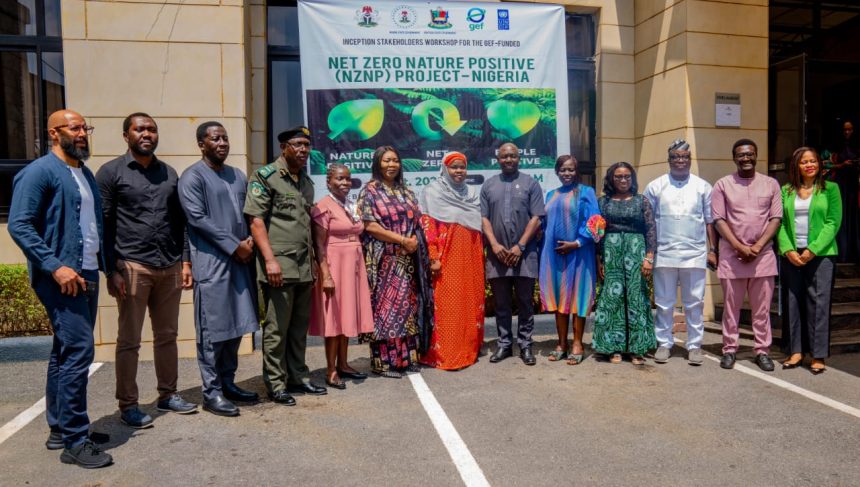From David Onuoja, Abuja
In a resolve to look for a permanent solution against climate change on Niger Deltans, the Global Environment Facility (GEF) project, in partnership with the United Nations Environmental Programme(UNEP), the United Nations Development Programme (UNDP) and a coalition of national and international stakeholders, has launched the Zero Nature Positive (NZNP) Project in Nigeria.
The event which took place in Abuja has all the stakeholders in attendance with the resolve to finding solutions to the recurring climate change problems facing the Niger Deltans Communities.
According to the Resident Representative of UNDP in Nigeria, Ms Elsie Attafuah said, “Today, we gather not only to launch a project, but to ignite a movement. A movement that reflects Nigeria’s bold commitments to achieve Net Zero emissions by 2060 and to conserve 30 percent of our land and marine ecosystems by 2030. These targets are ambitious, with the right partnerships and commitment, they are within our reach. We know too well that the urgency is real.
“Climate Change is already disrupting lives and livelihoods, biodiversity loss is accelerating, and vulnerable communities are bearing the heaviest burdens. The Niger Delta ML especially Rivers State and Bayelsa stands at the front lines of these challenges.
“This region is rich in biodiversity and natural wealth: vast mangrove forests, freshwater swamps, creeks, and rivers that support millions of people. Yet, it has also endured decades of pollution, environmental degradation, and the devastating impacts of climate change. The Net Zero Nature Positive Project offers us a chance to reverse this trajectory.
“This initiative aligns with Nigeria’s National Agenda on climate change mitigation and adaptation, as championed by His Excellency, President Bola Ahmed Tinubu. Under his leadership, Nigeria is accelerating efforts to implement the revised Nationally Determined Contributions (NDCs), advance the Energy Transition Plan, and drive forward policies that promote climate resilience, green growth, and environmental justice, especially in the Niger Delta region.
“Through this project, we will work with state governments in Rivers and Bayelsa to integrate net-zero and nature-positive strategies into development planning.
“Support communities to champion restoration efforts that reflect cultural values and local wisdom. Partner with women’s cooperatives and youth networks, ensuring they are not only beneficiaries but leaders of the green transition.
“Engage universities and research institutions in the region, tapping into local knowledge and innovation for sustainable solutions. Collaborate with the private sector, especially those operating in the Niger Delta, to embed environmental accountability and to channel investment toward green growth.
“For the people of Rivers and Bayelsa, this initiative will mean healthier ecosystems, restored wetlands and mangroves that protect against flooding, new opportunities for green jobs, and stronger community resilience against climate shocks.
“As UNDP, we commit to working side by side with our partners, the Federal Ministry of Environment, UNEP, the GEF, State governments, and local stakeholders to ensure this project delivers not just on global indicators, but also on the daily realities of farmers, fisherfolk, market women, youth entrepreneurs, and community custodians of nature.
“Let us remember that this is about people. It is about restoring dignity to communities long burdened by environmental loss. It is about turning today’s crises into tomorrow’s opportunities. And it is about ensuring that the Niger Delta, once defined by its challenges, becomes a beacon of resilience, innovation, and sustainability.
“Distinguished guests, today, we take a decisive step forward. On behalf of UNDP, I reaffirm our commitment to walk this journey with Nigeria. From the creeks of Bayelsa to the bustling cities of Rivers, and indeed across the entire nation, so that this Net Zero Nature Positive Project becomes a model for Africa and the world”, he said.







